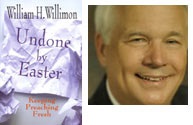Skill Builders
Article
Will Willimon on Preaching Powered by the Resurrection
When Will Willimon speaks, preachers listen. They also squirm or shudder, because he holds nothing back. In his book Undone by Easter: Keeping Preaching Fresh (Abingdon, 2009), Willimon rips "PowerPoint preaching" and the sermons of Rick Warren. He shows no sympathy for the pastor who resists an appointment to a dead, hopeless church. He even questions the effectiveness of the very homiletical methods he uses to invigorate his own preaching.

But make no mistake about this book. It is not a rant from a grumpy pastor and bishop. It is the plea of a pastor and bishop who is deeply committed to the power of the living God in preaching. The subtitle expresses Willimon's concern. Like other preachers, he wants to keep preaching fresh. He asks: "How do we preachers summon the nerve to say the same thing about Jesus over and over again?" To put it another way, how do you "preach a fourth Easter when you have already told the parishioners all that you know in the last three?"
The answer is in the title of his book. Fresh preaching comes from pastors who are undone by Easter. "All preaching," Willimon says, "is Easter preaching, dependent upon the truth of resurrection to make it work." Related to this is the role of the Holy Spirit. "God, in the power of the Holy Spirit, is the key to everything. … The Holy Spirit may be the most neglected aspect of homiletics today." If the power comes from the Holy Spirit, the content centers on Christ. Preaching is a working of "that space between redemption accomplished and redemption still being finished."
No evangelical would disagree in theory with Willimon's convictions. But, evangelicals disagree in practice when they limit preaching to "immediate, practical impact and instant, quantifiable results." This is the legacy of Schleiermacher, Willimon contends. Schleiermacher's modern theology elevates human experience of God over God himself. Hence, Willimon takes issue with Rick Warren's approach, seeing it as a capitulation to old liberalism. He explains: "The gospel is advocated on the basis of its utility in effecting desired outcomes and goods that are neither internal to nor promised by the gospel."
It is fair to ask if Willimon is overstating his point a bit, given the practical insight contained in a Book like Proverbs. I think he does not. Willimon's beef is with the reduction of all of our preaching to a set of "manageable, abstract propositions" or "common sense principles" that we find useful for day-to-day living.
Lest we think that Willimon expects less from a sermon that is undone by Easter, he insists that "preaching is frequently used by God to assault the status quo." After four decades of preaching, he observes: "I know enough about the Trinity to know that I never know what wild stunts God may attempt through preaching." Still, he cautions that "preaching is not to be judged for its immediate impact, but for its cumulative effect."
I need to hear this because I care about applying Scripture to life, and I pay attention when I hear rumblings that people to whom I preach want more "practical advice." Certainly, people need to know how to conduct themselves in a manner worthy of the gospel (Philippians 1:27). But if Willimon is right, that comes best by making the gospel "now" rather than "new"—by preaching Christ, the Resurrected One here, at this time and in this place. What I need as much or more than creativity is a homiletical virtue called persistence. The truth is, God has called preachers to be faithful over time, telling the gospel of Christ over and over again—not with a boredom that comes from a repeated handling of holy things but with a faith that is undone by Easter.
Steve Mathewson is senior pastor of CrossLife Evangelical Free Church in Libertyville, lllinois. He is also director of the doctor of ministry program at Western Seminary in Portland, Oregon.








